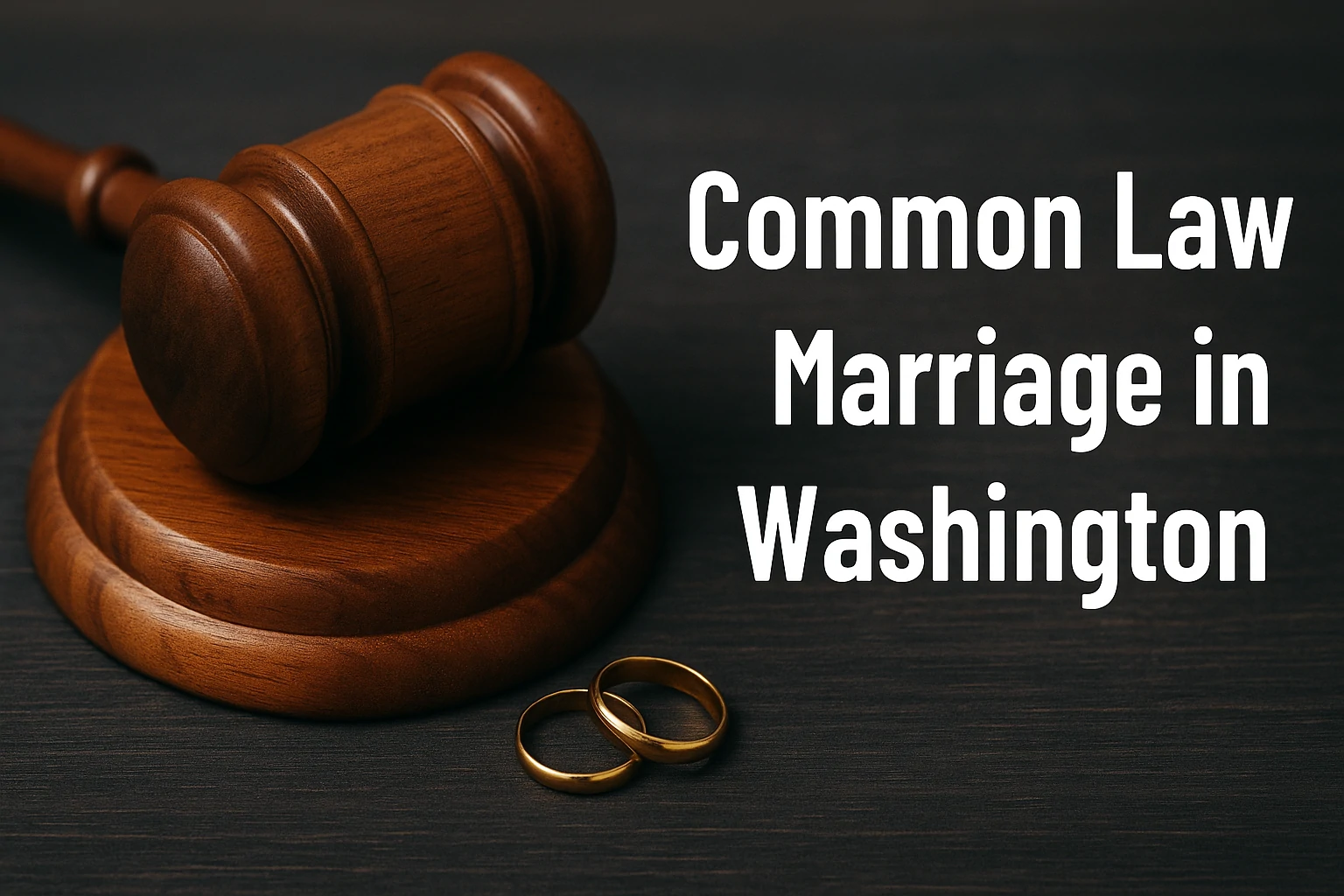Many people believe that living together for a long time makes a couple legally married. Some states recognize this type of relationship. It is called common law marriage. In most cases, a couple does not need a wedding or license to be treated like they are married. They just need to live together, share bills, and act as a couple. But not every state accepts this.
Washington State does not allow new common law marriages. Couples in Washington must meet other rules if they want legal protection without a formal marriage. Some long-term couples may still have rights, but these rights do not come from common law marriage. Instead, Washington uses a different system. The law calls it a “committed intimate relationship.”
Many people do not know this. They hear about common law marriage in movies or from friends. They think living with someone for a long time gives them the same rights as a married couple. This can cause problems, especially if the couple splits up or one person passes away.
This article will explain what common law marriage means, why Washington does not allow it, and what options couples have instead. If you live with someone but are not legally married, it is important to understand how the law sees your relationship.
What Is Common Law Marriage?
Common law marriage is a type of legal union. It happens when a couple lives together and treats each other like spouses. There is no marriage license. There is no wedding. But the couple shares their lives, property, and finances like a married pair.
In states that allow common law marriage, the couple must meet certain rules. These may include:
- Living together for a set time
- Calling each other husband and wife
- Telling friends and family they are married
- Filing joint tax returns
- Sharing bills and bank accounts
If the couple meets the state’s rules, the law may treat them as married. They can ask for property rights, spousal support, or legal help during a breakup.
Some states still allow this type of union. Learn more about common law marriage in Michigan to see how laws can differ.
Does Washington Have Common Law Marriage?
Washington does not let couples create a new common law marriage. Living together for many years does not count as a legal marriage in this state.
The state does accept common law marriages from places where they are legal. If your relationship started in one of those states and followed their rules, Washington may still honor it after you move.
Couples who begin their relationship in Washington must follow different rules. The courts may view their bond as a “committed intimate relationship.” This is not the same as marriage, but it can provide some legal rights in certain cases.
What Is a Committed Intimate Relationship?
A committed intimate relationship is a legal term used in Washington. It applies to couples who live together and build a life as partners. They are not married, but they share a close and steady relationship over time.
The court looks at different signs to decide if this type of relationship is real. These signs may include:
- Length of the relationship
- If the couple lived in the same home
- Whether they shared money or property
- If they raised children together
- Whether they acted like a couple in public
No single factor proves a committed intimate relationship. The court looks at the full picture. If the judge finds that the relationship meets these points, the couple may have some of the same rights as married couples.
Why This Matters
When a married couple splits up, the law gives them certain rights. They can divide property. They may ask for support. They may get help with child custody. But if you are not married and do not qualify for a committed intimate relationship, these rights may not apply.
This becomes a problem if one person owns most of the property or makes most of the money. The other person may feel left out, even if they shared the home for years.
If one partner dies, the other may not have any legal rights. Without a legal bond, they could lose the home or money they once shared. Living together does not always give protection. It is important to know how the law views your relationship. This helps you make smart choices and avoid future problems.
How to Protect Yourself
If you live with a partner and are not legally married, you can still take steps to protect yourself. Here are a few things you can do:
1. Make a cohabitation agreement
This is a written deal between two people who live together. It lists what each person owns and what will happen if they split up. It can also explain how bills and property will be shared.
2. Add both names to property
If you buy a home or car together, put both names on the title. This helps avoid problems later. It shows that both people have a right to the item.
3. Share financial records
Keep proof of who paid for what. This can help if you ever go to court. Save receipts, bank statements, or any shared bills.
4. Talk to a lawyer
A lawyer can explain your rights. They can also help write a cohabitation agreement or review other legal documents.
5. Plan for the future
Create a will or estate plan. This can make sure your partner gets support if something happens to you. Without a will, state law may not give them anything. You can also use a legal notice generator to help create simple legal documents.
When to Speak With a Lawyer
If you have lived with someone for many years, you may already be in a committed intimate relationship. But you may not know what rights you have. A lawyer can help you understand your situation.
It is a good idea to talk to a lawyer if:
- You plan to buy a home together
- You want to protect your income or savings
- You are thinking about breaking up
- You want to leave money or property to your partner
- One of you is moving in or out
Each case is different. A lawyer can look at your details and give advice that fits your needs.
What If We Break Up?
Breaking up is never easy. It can be worse if you have lived together for years and shared money, property, or kids. If you are not married, you do not go through divorce court. But you may still need legal help to divide what you shared.
If the court finds that you were in a committed intimate relationship, it may divide your property like it would in a divorce. This does not happen automatically. You need to ask the court to decide.
You may also need to deal with child custody or support. These follow the same laws as married parents. A lawyer can guide you through this and help protect your rights.
What If One of Us Dies?
This is a hard topic, but it matters. If your partner dies and you are not married, you may not get anything. You may lose your home, even if you helped pay for it.
To avoid this, plan ahead. Make sure both names are on property. Write a will or name each other in your estate plan. Update legal documents like bank accounts or life insurance.
If your partner dies without a plan, you may need to go to court. The court may not treat you like a spouse. This could leave you without support or a place to live.
Arizona has its own rules. You can read about common law marriage in Arizona to see how it compares.
Final Thoughts
Many people believe common law marriage still applies in Washington. It does not. The state does not allow couples to create new common law marriages. Instead, Washington uses a rule called a committed intimate relationship. This rule may give rights to couples who live together in a long-term, stable way.
If you live with someone but are not married, you should know how the law sees your relationship. You may have some rights, but only if you meet certain conditions. A lawyer can explain your options. A written agreement can offer protection. Good planning can prevent future trouble.
Do not wait until a crisis happens. Learn the law. Make smart choices. Protect your home, money, and peace of mind.
Disclaimer: This article provides general legal information for educational purposes only. It does not offer legal advice or create an attorney-client relationship. If you need legal help regarding your relationship or rights in Washington, please consult a licensed attorney in your area.




